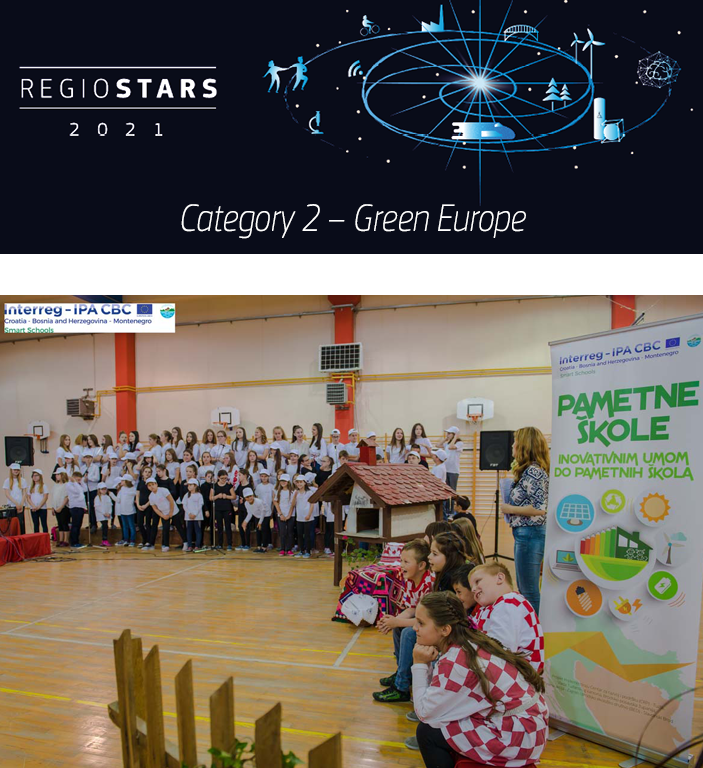Public authorities in Croatia and Bosnia and Herzegovina teamed up with civil society organisations to improve the carbon footprint of schools in the cross-border area. In parallel, the EU-funded Smart Schools project raised awareness of renewable energy and supported young innovators who developed ideas for smart gadgets.
- 10 June 2021
‘Smart Schools not only contributes to the infrastructural improvement of school facilities and to greater comfort for children and staff, but also promotes a new way of knowledge transfer.’
Renewable energy sources like the wind, wood and geothermal heat are abundant in Croatia and Bosnia and Herzegovina, but both countries still rely heavily on fossil fuels, which causes pollution and contributes to climate change. Public and commercial buildings in both countries consume a great deal of energy.
The project targeted public schools in the cross-border region and helped them become more sustainable by installing energy-efficiency measures and renewable energy systems.
Sustainable buildings
Seven schools in Brod-Posavina County in Croatia and Tuzla Canton in Bosnia and Herzegovina were made more energy efficient. Energy-saving measures such as thermal insulation and modern windows and doors were installed, leading to significant annual energy savings.
Photovoltaic systems were installed on the roofs of two of the schools. Several other schools were equipped with new biomass boilers that use wood instead of coal or gas for heating.
Thanks to these refurbishments, an extra 1 042 200 kilowatt-hours (kWh) of renewable energy is produced every year and 2 819 715 kWh of energy is saved annually. This is equivalent to an annual reduction of 853 tonnes in CO2 emissions.
Smarter energy use
The project increased awareness about renewable energy sources and energy efficiency among pupils and teachers. For almost two-and-a-half years, a range of activities highlighted easy ways in which people can lower their carbon footprints.
A four-month school competition encouraged children and teachers to save energy while learning. A total of 105 schools participated, with 34 022 pupils and 4 247 staff. Children learnt energy-saving tips that they could use at home and in everyday life.
Collectively, the participating schools used 7% less energy than the year before, according to their energy bills.
Encouraging innovation
In Croatia, a week-long camp for young innovators was organised in Brod-Posavina County. It was attended by 19 young people from both sides of the border. They learnt about renewable energy principles and energy efficiency. The innovations that resulted from the youth camp included a solar-powered grass cutter and a solar-powered dustbin that lets users know when it is full.
Overall, Smart Schools will save the participating schools EUR 89 758 on their energy bills annually, thanks to smarter energy management. Several ‘green’ jobs were created in both countries due to the refurbishment works on the schools.
A follow-up project, also co-funded by the EU, is to continue until 2023.
Beneficiaries
‘We do not use coal for heating, but wood pellets. My work is easier now. I do not inhale the dust and hazardous gases anymore, and my clothes and shoes are not dirty anymore. The school is no longer a polluter.’
Dževad Udvinčić, primary school energy manager
“I always wanted to be an entrepreneur. Participation in the camp of innovators helped me develop my ideas and to develop my entrepreneurial spirit. After the camp, I started my own business based on the innovation I presented at the camp.’
Salko Užičanin, young innovator
Total investment and EU funding
Total investment for the project “Smart Schools” is EUR 1 644 127, with the EU’s European Regional Development Fund contributing EUR 1 395 864 through the “Interreg IPA Cooperation Programme Croatia –Bosnia and Herzegovina-Montenegro” Operational Programme for the 2014-2020 programming period.

